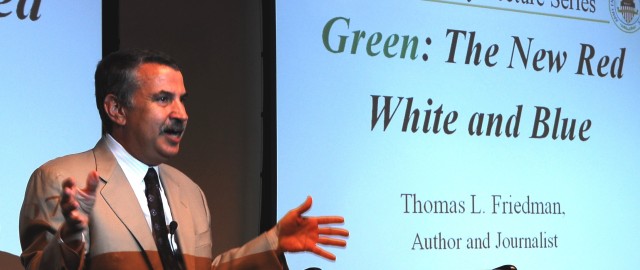WASHINGTON (Army News Service, June 28, 2007) - Pulitzer Prize winning journalist and author Thomas L. Friedman believes the "greening" of America can help the nation weather the war in Iraq, restore its natural place in the world order and greatly reduce international terrorism's financial resources.
Speaking at the most recent in a series of lectures on resource sustainability hosted by the Army Environmental Policy Institute, Mr. Friedman outlined the strategic implications of America's dependence on foreign oil and addressed what he called "an inconvenient truth" about the war on terrorism.
The Sept. 11 attacks "taught us we are in a war against people fueled and funded by our own energy purchases," he said. Believing that America's dependence on imported oil directly contributes to the funding of such groups as al-Qaeda and Islamic Jihad, Mr. Friedman said: "We are in the first war in American history where American taxpayers are funding both sides of the war."
Given the national-security concerns inherent in America's "addiction" to fossil fuels, coupled with the nation's role as leader of a free world increasingly concerned about the widespread effects of global warming, Mr. Friedman believes the United States must "take the lead in developing alternative energy resources to reduce oil consumption and the carbon dioxide it produces." Indeed, he believes that "going green is the most geo-strategic, geo-political and patriotic thing you can be or aspire to. Green is the new red, white and blue."
Moreover, Mr. Friedman believes the Army has a vested interest in being a leader in the "greening" of America. Referring to an incident mentioned in one of his recent "New York Times" commentaries, he spoke of the high cost - in both dollars and lives - of supplying fossil fuels to units in Iraq. Convoys carrying the fuels used to power tactical vehicles and the generators that light and air-condition American installations are prime targets for insurgents, he said, and by supporting the development and implementation of alternative energy sources the Army would be reducing casualties while at the same time depriving insurgents of significant sources of funding.
As a leading national institution, the Army is also uniquely qualified to spearhead what must be a widespread cultural shift, Mr. Friedman said, one on the same scale as the nation's desegregation efforts, in which the Army also played a key role.
"When the U.S. Army desegregated, the country really desegregated," he said in an April "New York Times Magazine" article. "And when the Army goes green, the country could really go green."
Equating America's current security and energy concerns with those faced by earlier generations who faced down the scourge of Nazism and defeated communism in order to make the world a better place, Mr. Friedman said: "If we are not the 'greenest' generation, our kids will never call us 'the greatest generation.'"
Mr. Friedman's expertise on the war against terror and on America's energy needs stems from his more than two decades as a foreign-affairs and economics reporter and columnist with the "New York Times." The three-time Pulitzer winner is also a best-selling author - his most recent book, "The World is Flat: A Brief History of the 21st Century," was released in April 2005.
The Army Environmental Policy Institute started its Sustainability Lecture Series in January 2006. Held monthly, lectures have featured speakers from industry, academia and non-profit organizations in an effort to inform Army leaders on emerging issues that impact the Army's ability to sustain the resources needed to continue its mission in the future.
"We're proud to have such a distinguished thought leader as Thomas Friedman participate in our Sustainability Lecture Series," said Tad Davis, Deputy Assistant Secretary of the Army for Environment, Safety and Occupational Health, who hosted the event. "We started these lectures as a way to educate Army leaders about the importance of sustainability and build situational awareness of these critical issues. The Army is leading the way in redefining green by buying green, building green and going green. We agree with Mr. Friedman that green is red, white, and blue. Army Green equals Army Strong."


Social Sharing